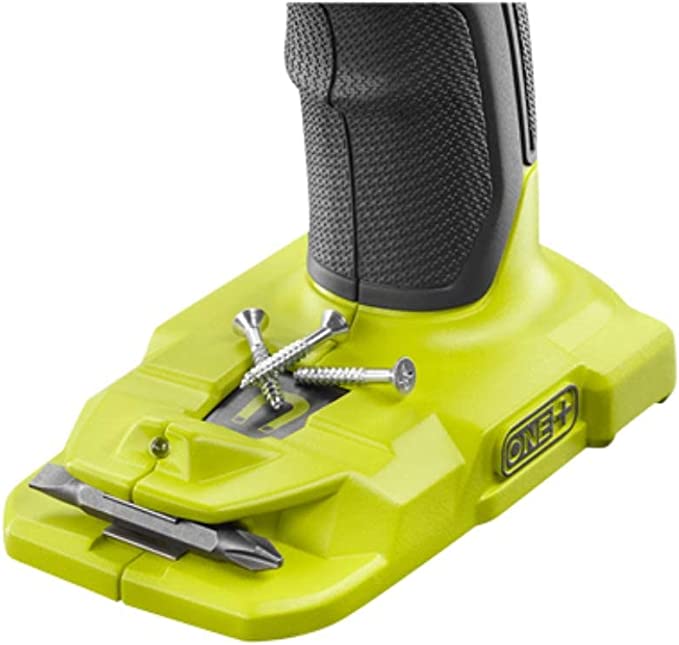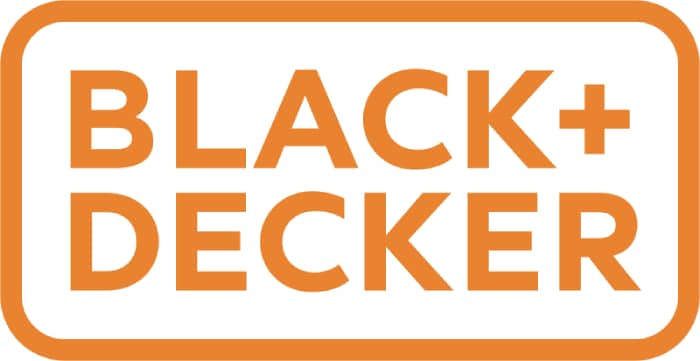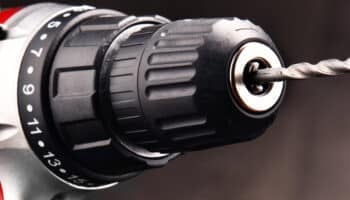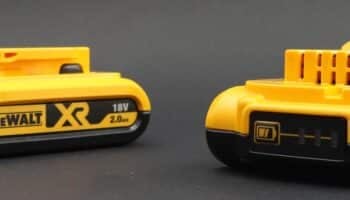We've independently reviewed this article to make sure it's as accurate as we can make it.
To find out more about our article creation and review process, check out our editorial guidelines.
Are you having a hard time comparing Ryobi vs Black and Decker power tools?
Don’t worry, this is a common issue. When it comes to choosing a power tool, you want to make sure you’re getting the biggest bang for your buck.
That’s why we’ve done the research for you, so you can relax knowing that you’re making an informed decision.
Although both brands are reliable, when comparing Black and Decker vs Ryobi power tools, you need to keep in mind different factors, such as quality of components, price, product selection, features, battery life, and more.
Are you ready to figure out whether Black & Decker or Ryobi produces the best power tools to meet your needs? Take a look at some helpful information below.
Comparing Ryobi vs Black and Decker
It’s important to dive into a few comparisons between Black & Decker and Ryobi before we explore some specific products.
#1 Quality
Both companies make great power tools at similar price points. Their prices tend to sit on the lower end of the spectrum, making these products great for home and DIY use. That might even be why you are looking at them.
While there are other things you should keep in mind when shopping for a new power tool, reading reviews can give you an idea of how well a brand performs.
That’s why we decided to take a closer look at the reviews of both Black & Decker and Ryobi power tools. We found that customers generally express satisfaction with both brands.
Although the tools are probably not suitable for daily use by professionals, their power tools boast significant power, decent longevity, and easy usability.
While the reviews can vary slightly from product to product, both companies make great power tools.
#2 Warranty
If you are purchasing power tools, you probably want to know about warranties. A strong warranty is a sign of confidence in the product offered by the company. If the company offers a great warranty, you know they are confident in their tools.
Ryobi generally offers a three-year warranty on its power tools; however, some warranties can be as long as five years. Black & Decker warranties can vary from tool to tool. Some have a limited lifetime warranty, while others have a two-year warranty.
This is a shorter warranty than the typical one offered by Ryobi.
Therefore, Ryobi typically offers a better warranty than Black & Decker. While you don’t want to have to use the warranty, it is nice to have this extra security blanket.
#3 Product Selection
Finally, you might also want to know about the different products you might purchase.
Black & Decker is one of the largest companies in the world, so they have one of the largest product selections as well.
This allows you to customize your options to meet your specific needs. In contrast, Ryobi has fewer options.
So, if you are looking for sanders, saws, or angle grinders, please keep in mind that Black & Decker has a much larger product selection than Ryobi.
Black & Decker 18 V vs Ryobi 18 V Cordless Drill
Now that you have an overview of Black & Decker and Ryobi, it is time to take a closer look at a few specific products from which to choose, such as drills.
Both Black & Decker 18 V Cordless Drill and Ryobi 18 V One are popular options.
They can handle wood, plastic, metal, and much more. They also come with different types of bits from which you can choose as well.
However, there are some notable differences, including:
#1 Features: The Bit and Chuck
Both companies feature models with a keyless chuck, making it easier for you to change bits.
The Black and Decker drill features a 3/8-inch chuck, while the Ryobi drill features a ½-inch chuck.
A 1/2-inch chuck can accept a bit with a 1/2-inch shaft or smaller, while a 3/8-inch chuck can accept only 3/8-inch shafts and smaller.
Either size will work well for home projects, but the larger chuck of the Ryobi drill may be more suitable for bigger projects.

The Ryobi cordless drill features a MagTray. This is a magnetic plate that can hold the screws and bits for you as you work.
This reduces your chances of losing your items and is a nice addition that Black and Decker does not include.
#2 Clutch Position
Next, think about the clutch position of the drill. The clutch is responsible for disengaging the bit from the motor when your drill reaches a certain torque or power level.
This is important because you do not want to drill through the wall or break the screw.
Black & Decker 18v cordless drills come with an 11-position clutch, while Ryobi drills feature a 24-position clutch.
As you can see, Ryobi cordless drills offer more options for controlling the amount of torque.
#3 Rotation Speed
The rotation speed refers to how quickly the drill bit moves in a circular pattern. Rotation speed is not the same as torque, as torque refers to the power the tool exerts.
The speed may vary depending on the specific model. For example, a Black & Decker BCD003C2K-GB drill can rotate from zero to 1400 RPM, while Ryobi has some 18v cordless drills that can rotate up to 1700 RPM.
So, if you need a tool that can drill through material more quickly, choose the model with the higher RPM.
Just bear in mind that some projects, such as drilling through soft materials, may not require a high RPM.
#4 Battery
Another factor to consider is the battery life of the two options. Both drills feature similar battery lives based on average use.
You shouldn’t have to worry about the battery power of these two drills running out quickly; however, you also have to think about recharge time.
The charging time will also vary depending on the drill model. Generally speaking, a Black and Decker battery can take anywhere from 3 to 6 hours to fully charge.
The Ryobi drill has a faster charging time (55 minutes to 3 hours 20 minutes), so you should be able to get back to work quickly.
In this category, the Ryobi drill is better.
#5 Ergonomics and Weight
You also need to think about how easy the drills are to use. Both drills are fairly ergonomic, meaning they should be comfortable in your hand.
Both Black & Decker and Ryobi18v cordless drills weigh approximately 3 pounds.
The drills have been designed to sit well in your hand, keeping you comfortable as you work.
#6 Price
The price of each model depends on where you shop.
As of the time of writing, the Black & Decker 18 V drill was priced at $52, while the Ryobi 18 V Drill was priced at $59.
Although their prices are very similar at the time of writing, it’s worth noting that discounts on either drill may be available at certain times.
Where Do Black & Decker and Ryobi Come From?
Now, it’s time to learn more about these the histories of Black & Decker and Ryobi. This will give you an insight into the brands’ priorities.
An Overview of Ryobi
Ryobi is a Japanese company. It is headquartered in Hiroshima and opened its doors in the middle of World War II, in 1943.
First, Ryobi manufactured die-cast products. Then, it started to manufacture printing presses in 1961, the same year it was listed on the Tokyo Stock Exchange. Ryobi started manufacturing power tools in 1968.

Since that time, Ryobi has grown into one of the largest power tool companies in the world. It boasts 12 manufacturing plants and more than 10,000 employees.
It’s worth mentioning that Ryobi manufactures other brands as well, like Ridgid, and Homelight.
Ryobi supplied power tools to Sears prior to that company closing its doors. Now, it is mainly sold in Home Depot stores, but some products are available at both Walmart and Amazon
An Overview of Black & Decker
Black & Decker is an American manufacturer of power tools that opened its doors in 1910.
While the company is still known as Black & Decker, the company actually merged with Stanley Works. Now, the official name is Stanley Black & Decker.

Black & Decker is headquartered in Baltimore, MD. The company owns a variety of other power tool brand names including DeWalt, Craftsman, and Porter-Cable.
Black & Decker is one of the largest manufacturers of power tools in the world, with numerous manufacturing plants and more than 30,000 employees.
Recapping
Now that we’ve gone through the good and bad aspects of each brand’s products, it’s time to take a look at the general picture. I know I just bombarded you with information, so a little table recapping everything seems in order.
Black & Decker
| Pros | Cons |
| Some of their products have lifetime warranties | Shorter warranty than Ryobi in non-lifetime warranty products |
| Wider product range | Smaller standard chucks |
| Torque control is ok, but there aren’t too many options | |
| Slower charging times |
Ryobi
| Pros | Cons |
| Typically has longer product warranties | Smaller product range |
| Larger standard chuck (better for bigger projects) | Shorter warranty vs B&D’s lifetime products |
| Superior torque control and adjustability | |
| Faster charging |
Which Option Is Right for You?
When it comes to choosing between Black and Decker vs Ryobi power tools, you need to consider different factors, such as product specifications, warranty, price, and more.
For example, if you want an 18V cordless drill, Ryobi comes with a longer 3-year warranty and charges faster. It also often offers a higher rotation speed.
Remember, the ultimate decision will vary depending on your needs and preferences.
Thank you so much for taking the time to read this article! If you found it helpful, please make sure to check out our relates posts below.
Have a great day!
Frequently Asked Questions
How Long Should Power Tools Last?
Depending on the quality of the manufacturer and the materials used, power tools are expected to last at least 3 years.
However, they can last much longer if cared for properly and maintained often.
What’s the Average Price of a Power Tool?
To answer this, let’s define what kind of power tools.
Smaller tools, like grinders, drills, and blowers are typically priced in the range of $40-100. This, of course, doesn’t include professional-grade tools.
On the other hand, industrial power tools, such as table saws, air compressors, and bandsaws are much more expensive, ranging between $150-10,000 or more!
How Much Torque Do I Need in a Drill for Home Projects?
For most household projects, you should be able to get away with a drill that offers anywhere between 15 and 20 pound-feet. Luckily, most cordless drills have exactly that much torque!







